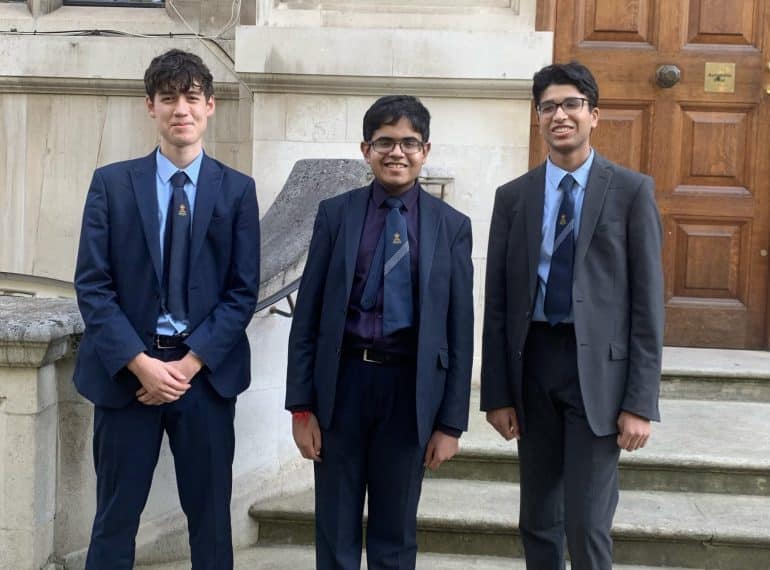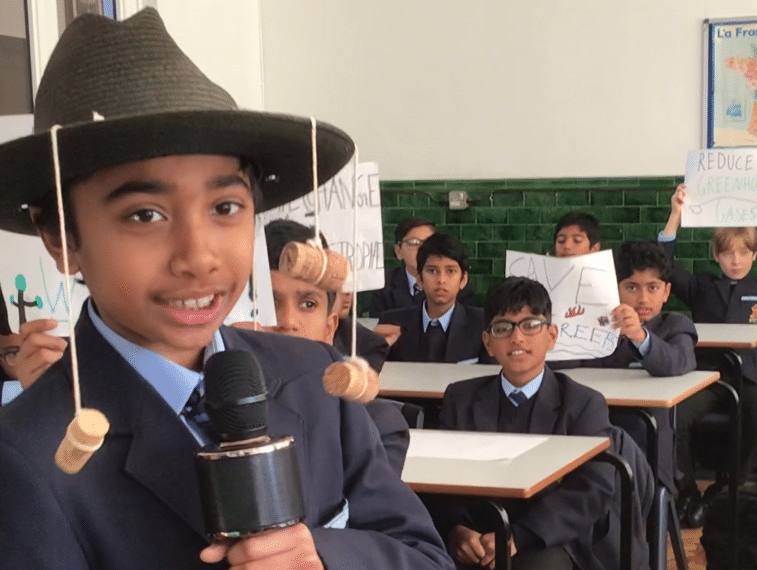
Hundreds of QE boys got to grips with the complexities of competing priorities around the world as they battled to solve the climate crisis at the School’s mock COP26 Summit.
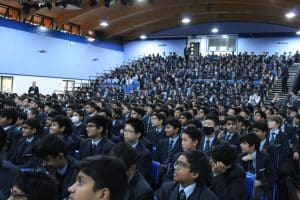 All boys from Years 7–10 took part, with each form group representing a country, producing a short video and putting forward a delegate in the debates. These delegates fought their corner passionately, challenging each other’s records – although perhaps not always with the delicate diplomacy expected at a global summit!
All boys from Years 7–10 took part, with each form group representing a country, producing a short video and putting forward a delegate in the debates. These delegates fought their corner passionately, challenging each other’s records – although perhaps not always with the delicate diplomacy expected at a global summit!
Afterwards, mock summit organiser and Extra-Curricular Enrichment Tutor Stephanie Tomlinson, who is leading the School’s Eco-Network, reflected on the success of the afternoon event, which was held in the Shearly Hall. “The boys really embraced putting themselves in the shoes of their given nation, teasing out the tensions between economic development and sustainability, and nations’ relative contributions toward present and historic warming.
“Delegates effectively made the case for working together, heeding pleas from the likes of the Marshall Islands for concerted action before they were submerged by sea level rises.
“Overall, facts and figures were commanded well and it was great to see boys from Year 7 holding their own against those in Year 10.”
The afternoon was hosted by School Captain Siddhant Kansal and the two Senior Vice-Captains, Sultan Khokhar and Paul Ofordu, all of Year 13.
Several other sixth-formers took part in a panel that directed discussion, challenging the delegates and making suggestions to facilitate debate. The panel members were: Vice-Captains Aadarsh Khimasia and Mark Markov, of Year 13, and Eco-Ambassadors Theo Mama-Kahn and Amogh Bhartia, of Year 12.
The videos produced by each form group about the position of their given nation were judged as part of a House competition. Harrisons’ House won this competition, with its films collectively adjudged to be the best overall. Pictured, top, is a scene from the Year 7 Broughton video: the form were representing Australia.
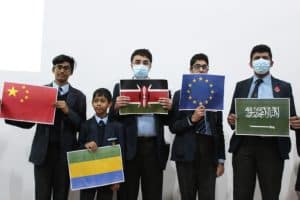 Nations had been put into thematic groups – focusing on areas such as cities, forest, or oceans – and urged to discuss, to negotiate and to attempt to come to a joint decision. Each nation then had the opportunity to speak, with many focussing, on the one hand, on their own context – including their level of economic development and current pollution levels – and, on the other, making the case that their own climate targets (such as net zero carbon dates) were, in fact, ambitious.
Nations had been put into thematic groups – focusing on areas such as cities, forest, or oceans – and urged to discuss, to negotiate and to attempt to come to a joint decision. Each nation then had the opportunity to speak, with many focussing, on the one hand, on their own context – including their level of economic development and current pollution levels – and, on the other, making the case that their own climate targets (such as net zero carbon dates) were, in fact, ambitious.
Crispin Bonham-Carter, Assistant Head (Pupil Involvement) said: “The aim was for the debate to look firstly at how countries were delivering on their previous climate objectives and then to examine what further actions they could take, both in terms of mitigation and adaptation.
“I was pleased to see that the discussion did, in fact, cover a range of issues and themes, from deforestation and protecting forests, to the use, or abandonment, of coal.
“And just as we saw in the actual summit in Glasgow, there was a significant amount of wrangling between nations with respect to aid and financial support: smaller, low income, and less polluting countries repeatedly threw down the challenge to the larger, wealthier nations to provide financial support, arguing that they were not going far enough with this, nor with actions to limit and reverse carbon emissions.
“Countries like China then argued that they were still developing, having only seen rapid growth over the last 40 or so years, compared with Britain, where the Industrial Revolution took off more than two centuries ago. Other nations remarked that it was good to see the Chinese delegate in attendance(!), but were critical of the country’s record.
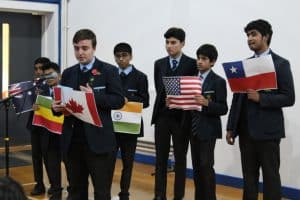 “China’s delegate did, though, make a powerful argument that a significant proportion of China’s emissions were producing and exporting products being bought by those in other parts of the world (including the West), who were, in effect, therefore outsourcing their emissions.
“China’s delegate did, though, make a powerful argument that a significant proportion of China’s emissions were producing and exporting products being bought by those in other parts of the world (including the West), who were, in effect, therefore outsourcing their emissions.
“There were examples of co-operation, with, for example, the UK working with Brazil to support the reversal of deforestation in the Amazon and an offer from Saudi Arabia to Canada to provide lower oil prices in exchange for support with renewable energy.”
In his concluding remarks, panel member Amogh Bhartia, who is a member of the London Schools Eco-Network, said the mock COP26 had shown boys the challenges of reaching international consensus. Events such as the Glasgow summit and the protests of climate activists could sometimes feel distant in terms of boys’ daily lives, he acknowledged. But such an impression was false, he said, and he urged pupils to take grassroots action, such as campaigning in school, organising a clothes swap, writing a magazine article or penning a letter to their local MP.
“If you can do that, and collaborate with others, then we will see change in our community – a change that will inspire others…Be the first and others will follow. Be the first, and inspire the change that our planet desperately needs.”
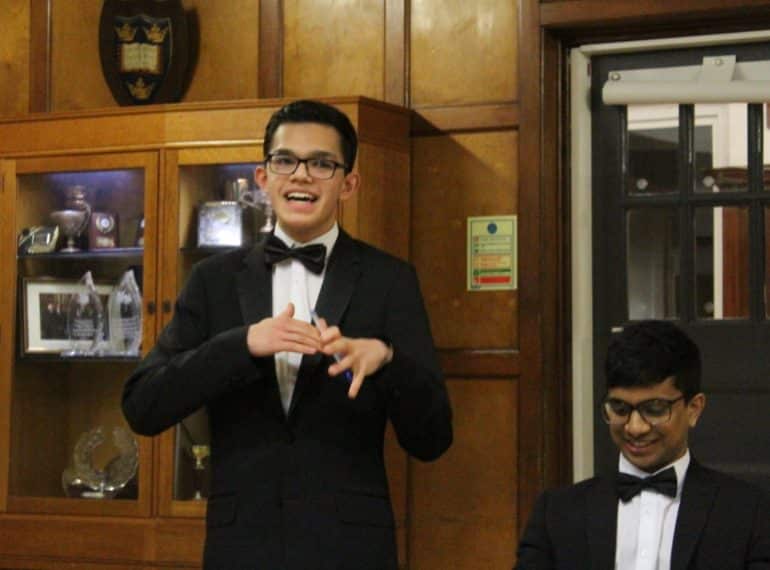
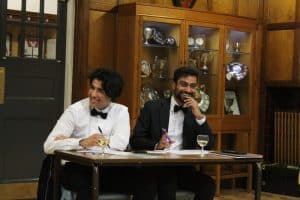 The pair took on Old Elizabethan challengers Ravi Karia and Jathieesan Umaasuthan (both OE 2011–2018), who argued against the motion, This House would ban all non-electric vehicles.
The pair took on Old Elizabethan challengers Ravi Karia and Jathieesan Umaasuthan (both OE 2011–2018), who argued against the motion, This House would ban all non-electric vehicles.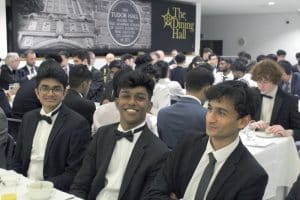 “Not only was it the first time some had worn black-tie, but I understand that one boy’s clip-on bow tie had been manufactured only that morning using a 3D printer!” added Mrs Mayer.
“Not only was it the first time some had worn black-tie, but I understand that one boy’s clip-on bow tie had been manufactured only that morning using a 3D printer!” added Mrs Mayer.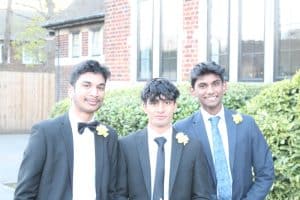 The visitors were formally proposed by the 2021 School Captain, Siddhant Kansal, of Year 13, while the Elizabethan Union was proposed by Izzet, who last month took up a new post with international law firm Kirkland & Ellis.
The visitors were formally proposed by the 2021 School Captain, Siddhant Kansal, of Year 13, while the Elizabethan Union was proposed by Izzet, who last month took up a new post with international law firm Kirkland & Ellis.
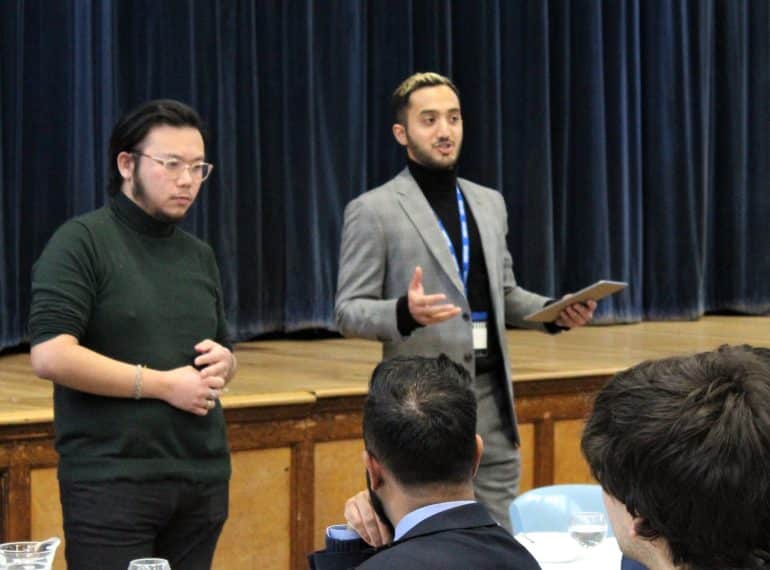
 Headmaster Neil Enright said: “The luncheon is part of our programme aimed at supporting boys in line with the commitment in our mission statement to produce young men who are ‘confident’ and to ‘nurture intellectual, verbal and social skills, giving pupils the ability to act appropriately in any situation’. It is also, of course, a nice opportunity to get together over a long lunch, with the boys being joined by their form tutors and by senior staff.
Headmaster Neil Enright said: “The luncheon is part of our programme aimed at supporting boys in line with the commitment in our mission statement to produce young men who are ‘confident’ and to ‘nurture intellectual, verbal and social skills, giving pupils the ability to act appropriately in any situation’. It is also, of course, a nice opportunity to get together over a long lunch, with the boys being joined by their form tutors and by senior staff.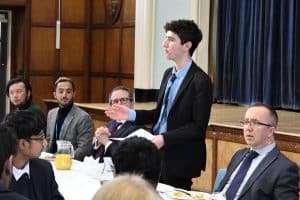 The lunch was the first formal occasion presided over by the 2022 School Captain, Theo Mama-Kahn, who was the master of ceremonies. He was supported by Senior Vice-Captains Antony Yassa – who introduced Arjun and Matthew – and Ansh Jassra, who said the grace and delivered the vote of thanks following the speeches.
The lunch was the first formal occasion presided over by the 2022 School Captain, Theo Mama-Kahn, who was the master of ceremonies. He was supported by Senior Vice-Captains Antony Yassa – who introduced Arjun and Matthew – and Ansh Jassra, who said the grace and delivered the vote of thanks following the speeches.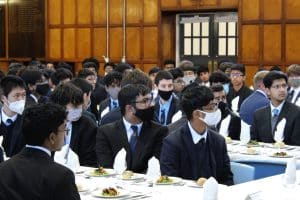 Arjun also cited Apple co-founder Steve Jobs’ now-famous speech at Stanford University in 2005: “…you can’t connect the dots looking forward; you can only connect them looking backward. So you have to trust that the dots will somehow connect in your future.”
Arjun also cited Apple co-founder Steve Jobs’ now-famous speech at Stanford University in 2005: “…you can’t connect the dots looking forward; you can only connect them looking backward. So you have to trust that the dots will somehow connect in your future.”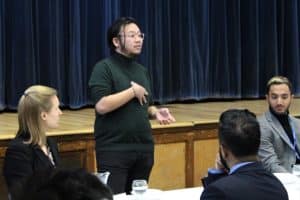 He stressed that “the path through life is not always a means to an end”, urging boys to own their decisions – “good and bad” – since “they make you who you are”, thus again corresponding to Steve Job’s maxim about joining the dots.
He stressed that “the path through life is not always a means to an end”, urging boys to own their decisions – “good and bad” – since “they make you who you are”, thus again corresponding to Steve Job’s maxim about joining the dots.
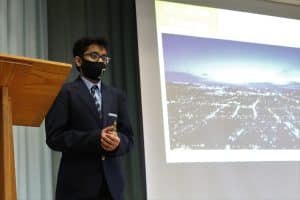 Arhan Panjwani, of Leicester House, took first prize with a talk that urged the grand final audience in the Main School Hall to consider the effect we are having on the world around us and to take action. It was illustrated by his aerial photo of the area near his home, taken by a drone.
Arhan Panjwani, of Leicester House, took first prize with a talk that urged the grand final audience in the Main School Hall to consider the effect we are having on the world around us and to take action. It was illustrated by his aerial photo of the area near his home, taken by a drone.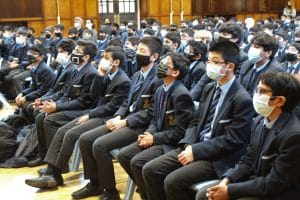 Boys were allowed to speak for up to three minutes about their photograph, but had to talk without notes. Merits were awarded for all six finalists, with 20 House points given for first place, 14 for second and 10 for third.
Boys were allowed to speak for up to three minutes about their photograph, but had to talk without notes. Merits were awarded for all six finalists, with 20 House points given for first place, 14 for second and 10 for third.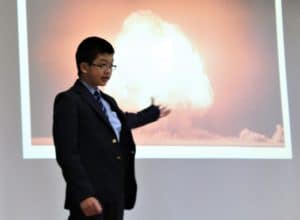 “Notwithstanding such use of ‘human interest’ and the effective deployment of humour by some, many of the boys used their photo to make an important point and deliver a message with wide meaning, giving us plenty to think about.”
“Notwithstanding such use of ‘human interest’ and the effective deployment of humour by some, many of the boys used their photo to make an important point and deliver a message with wide meaning, giving us plenty to think about.”
 All boys from Years 7–10 took part, with each form group representing a country, producing a short video and putting forward a delegate in the debates. These delegates fought their corner passionately, challenging each other’s records – although perhaps not always with the delicate diplomacy expected at a global summit!
All boys from Years 7–10 took part, with each form group representing a country, producing a short video and putting forward a delegate in the debates. These delegates fought their corner passionately, challenging each other’s records – although perhaps not always with the delicate diplomacy expected at a global summit! Nations had been put into thematic groups – focusing on areas such as cities, forest, or oceans – and urged to discuss, to negotiate and to attempt to come to a joint decision. Each nation then had the opportunity to speak, with many focussing, on the one hand, on their own context – including their level of economic development and current pollution levels – and, on the other, making the case that their own climate targets (such as net zero carbon dates) were, in fact, ambitious.
Nations had been put into thematic groups – focusing on areas such as cities, forest, or oceans – and urged to discuss, to negotiate and to attempt to come to a joint decision. Each nation then had the opportunity to speak, with many focussing, on the one hand, on their own context – including their level of economic development and current pollution levels – and, on the other, making the case that their own climate targets (such as net zero carbon dates) were, in fact, ambitious. “China’s delegate did, though, make a powerful argument that a significant proportion of China’s emissions were producing and exporting products being bought by those in other parts of the world (including the West), who were, in effect, therefore outsourcing their emissions.
“China’s delegate did, though, make a powerful argument that a significant proportion of China’s emissions were producing and exporting products being bought by those in other parts of the world (including the West), who were, in effect, therefore outsourcing their emissions.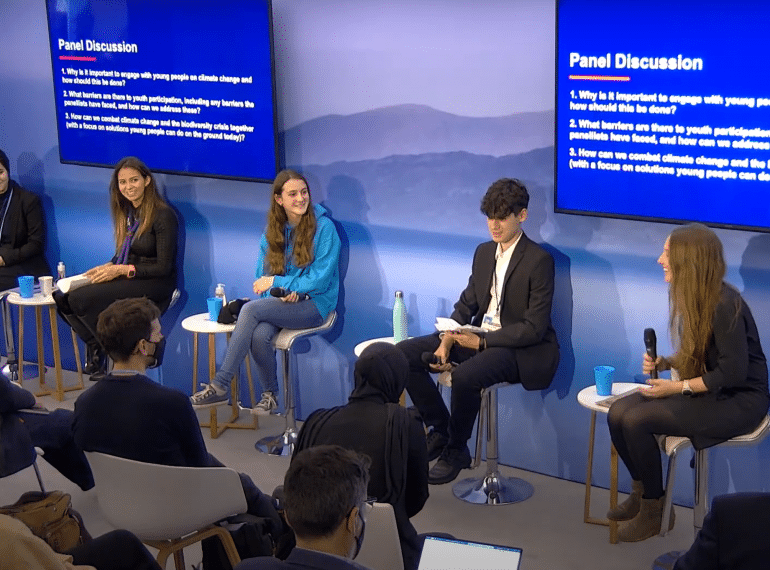
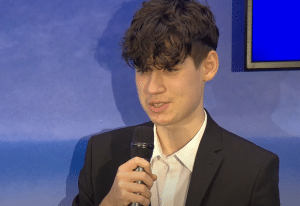 “I feel national school campaigns on climate change awareness can be a big factor in the younger generation learning about what impacts they have on the climate and how they can help mitigate and stop climate change,” Toma told other members of the five-strong panel and the assembled audience in Glasgow.
“I feel national school campaigns on climate change awareness can be a big factor in the younger generation learning about what impacts they have on the climate and how they can help mitigate and stop climate change,” Toma told other members of the five-strong panel and the assembled audience in Glasgow.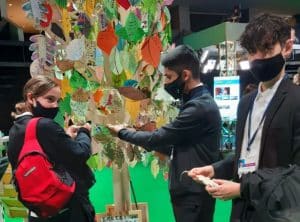 Reflecting on his experience after returning to School, Toma said that being at COP 26 with delegates and leaders from around the world was “surreal”, but noted that there were “lots of different people with the same ambitions”. Asked about the prevailing mood, Toma said: “People were secretly optimistic, outwardly expecting the worst, but hoping for the best.”
Reflecting on his experience after returning to School, Toma said that being at COP 26 with delegates and leaders from around the world was “surreal”, but noted that there were “lots of different people with the same ambitions”. Asked about the prevailing mood, Toma said: “People were secretly optimistic, outwardly expecting the worst, but hoping for the best.”